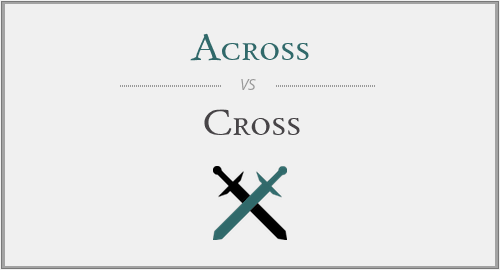Definition and Spatial Connotations:
"Across" is a preposition and adverb commonly used to describe movement from one side to another, usually indicating a traversing action over a barrier, obstacle, or distance. It conveys the idea of moving in a horizontal or transverse direction. Conversely, "cross" is a verb that signifies moving from one side to another by intersecting, often forming a perpendicular or diagonal path. It implies the act of going over, through, or intersecting at a point.
Spatial Metaphors and Symbolism:
Beyond their literal spatial implications, both "across" and "cross" can carry metaphorical and symbolic meanings. "Across" often suggests the idea of overcoming obstacles, encountering something on the opposite side, or exploring different areas or domains. It can represent a journey, transition, or bridging of gaps. "Cross," on the other hand, holds symbolic weight, often associated with intersections, connections, and crossing boundaries. It can denote the blending of cultures, the meeting of paths, or the convergence of ideas.
Usage and Context:
The context in which "across" and "cross" are used further distinguishes their meanings. "Across" is commonly employed when referring to physical spaces, such as crossing a street, spanning a bridge, or traveling from one city to another. It can also describe traversing abstract concepts, like getting across an idea or conveying a message effectively. "Cross," on the other hand, finds application in various contexts, ranging from religious symbolism (as in the Christian cross) to the act of intersecting lines, solving puzzles, or making a mark on a surface. It can also describe the action of intersecting paths or crossing boundaries, both literal and metaphorical.

Idiomatic Expressions and Phrasal Verbs:
Both "across" and "cross" contribute to a rich tapestry of idiomatic expressions and phrasal verbs. "Across" is present in phrases such as "across the board" (indicating inclusivity or universality), "come across" (encountering something or someone unexpectedly), or "get across" (successfully communicating an idea). On the other hand, "cross" is found in expressions like "cross paths" (meeting or encountering someone), "cross off" (marking an item as completed), or "cross over" (transitioning from one state to another).
Conclusion:
While "across" and "cross" share etymological roots and touch upon the concept of traversing or intersecting, they diverge in their specific meanings, spatial implications, and symbolic connotations. "Across" pertains to moving horizontally or overcoming obstacles, while "cross" signifies intersecting, connecting, and crossing boundaries. Understanding the subtle differences between these two words enriches our language skills and enhances our ability to communicate effectively, both in literal and metaphorical contexts. So, whether we journey "across" vast landscapes or "cross" paths with new experiences, each word invites us to explore the nuances and depths of human expression.




Have a discussion about this article with the community:
Report Comment
We're doing our best to make sure our content is useful, accurate and safe.
If by any chance you spot an inappropriate comment while navigating through our website please use this form to let us know, and we'll take care of it shortly.
Attachment
You need to be logged in to favorite.
Log In